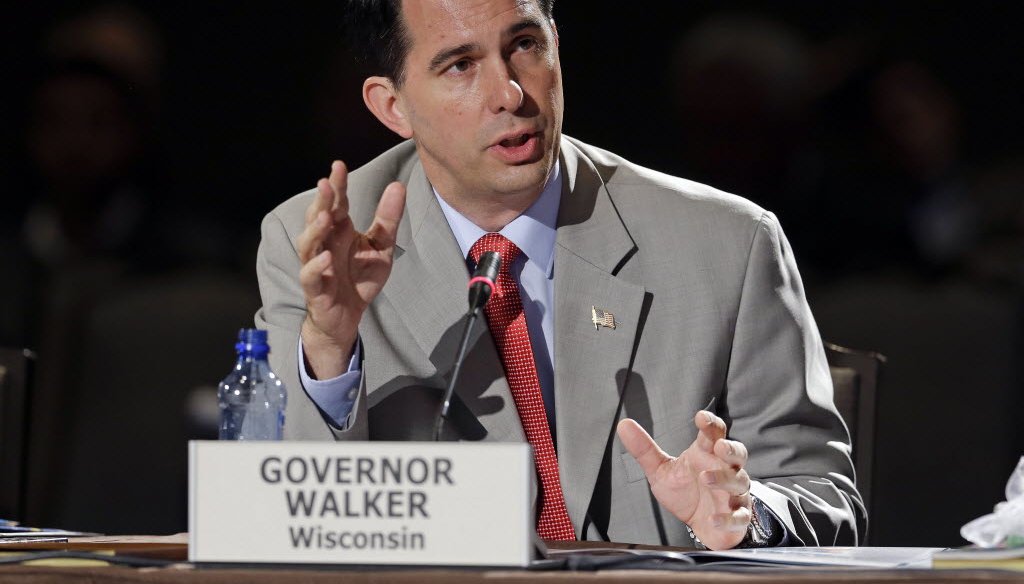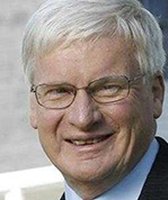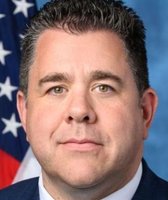Stand up for the facts!
Our only agenda is to publish the truth so you can be an informed participant in democracy.
We need your help.
I would like to contribute

Wisconsin Gov. Scott Walker speaks during a meeting on jobs and education at the National Governors Association convention Saturday, July 12, 2014, in Nashville, Tenn.
Gov. Scott Walker says legal requirements rather than political calculations explain his appeal of a federal court decision overturning Wisconsin’s ban on gay marriage.
Asked July 12, 2014 why he appealed at a time when some governors have not fought such rulings, the Republican said it had nothing to do with his personal support for traditional marriage.
"Simple answer," Walker told Associated Press national political reporter Steve Peoples at the National Governors Association meeting in Tennessee. "On January 3rd, 2011, I raised my hand and took an oath. That oath says I support the constitution of the state of Wisconsin. Until the courts say otherwise or until the voters someday change that, if they ever did, I’m obligated as is the attorney general to support the constitution of the state of Wisconsin."
He added: "That (marriage ban) is in the constitution, so unlike some other states like Pennsylvania where it was a statutory change, unless I’m violating my oath, I don’t have any choice."
Was Walker duty-bound by his oath of office to appeal?
Sign up for PolitiFact texts
We set out to test Walker’s claim on the Truth-O-Meter, but determined after interviewing legal experts that a definitive rating is elusive, given the unusual circumstances and lack of clear guidance in the oath or Wisconsin law or court rulings.
Before we explain, let’s first review how we got to this place.
-
In the fall 2006 election 59 percent of voters approved an amendment to the state constitution declaring that, "Only a marriage between one man and one woman shall be valid or recognized as a marriage in this state." Walker, then the Milwaukee County executive, backed the amendment, which essentially outlawed gay marriage. The vote came after approval by two Republican-led Legislatures.
-
In June 2013, the U.S. Supreme Court struck down a section of the 1996 federal act defining marriage as between a man and woman under federal law. That gave momentum to the gay-marriage movement.
-
In June 2014, following the lead of judges in 14 states since 2013, U.S. District Judge Barbara Crabb in Madison declared that Wisconsin's ban on same-sex marriage violated the U.S. Constitution's guarantee of equal protection of the law. (Colorado has since joined the list). About 500 couples got married before Crabb put her ruling on hold pending the outcome of appeals.
Walker and other state officials were defendants in the lawsuit that prompted Crabb’s ruling. Four same-sex couples filed suit with help from the ACLU of Wisconsin.
In the wake of the ruling, Walker -- a candidate for re-election this November, and potential 2016 presidential candidate -- has downplayed his personal opposition to gay marriage.
A discordant chorus of voices has urged him to drop the appeal, press on in hopes of winning before a higher court, or ignore federal legal ruling entirely on states’ rights grounds.
The Oath
Here’s what Walker said in January 2011, when sworn in by state Supreme Court Chief Justice Shirley Abrahamson:
"I, Scott Walker, solemnly swear that I will support the constitution of the United States and the constitution of the state of Wisconsin, and that I will faithfully and impartially discharge the duties of the office of Governor to the best of my ability. So help me God."
As Walker told the Associated Press, the oath requires him to support the state constitution. But it also requires him to support the U.S. Constitution.
So, faced with a ruling that a state constitutional amendment violates the U.S. Constitution, what are Walker’s obligations?
As mentioned, legal experts disagree, leaving this largely a matter of interpretation.
There was agreement, though, that the U.S. Constitution’s Supremacy Clause holds that federal laws exercising powers in the U.S. Constitution are the "supreme law of the land," trumping state laws and state constitutions when they are in conflict with federal counterparts.
Former state Supreme Court Justice Janine Geske, who was appointed by a Republican governor, said Walker "obviously cannot ‘uphold the Wisconsin Constitution’ if it definitively is found to violate the federal Constitution."
But until an appeal works its way through the higher courts, most governors would feel an obligation to defend their state constitutions in instances such as this, Geske said.
"I do believe that he is mandated to appeal if he believes it is constitutional," she said. "My sense is that he does have an obligation to fight for a finding of constitutionality … but I do not know of any authority to force him to do so if he refused."
Donald Downs, a University of Wisconsin-Madison political science professor and former director of its Center for the Study of Law, Society and Justice, believes Walker had discretion on whether to appeal.
"The oath will always leave room for discretion, especially if the governor believes the State Constitution is inconsistent with the U.S. Constitution, which is supreme," Downs said.
But Downs added that if Walker thinks Crabb's ruling is wrong and that there are grounds for appeal, the oath certainly provides him with one justification.
"Politicians are politicians, and they often mask political moves with constitutional claims," Downs said. "But that doesn't mean there isn't a constitutional justification for it, and that the act is not justified by the oath."
Special circumstances?
To be sure, the state is routinely sued, and sometimes settles cases either short of appeal or after losing in the lower courts. Republican Attorney General J.B. Van Hollen, for instance, decided not to fight a redistricting ruling as part of a challenge by several groups to the constitutionality of newly drawn legislative-district maps.
"They don’t defend every state law to the teeth," noted the ACLU’s Wisconsin legal director, Larry Dupuis.
In the gay-marriage suit decided by Crabb, Walker was one of the defendants, so as the client he could have insisted that Van Hollen settle on his behalf (though it’s an open question whether Van Hollen then would have had the authority to proceed anyway).
So what makes this situation different than those cases?
Van Hollen, who filed the appeal, believes the oath means that he and the governor, as constitutional officers, carry the obligation to resolve this constitutional arguments through appeals.
"Whether Wisconsin’s marriage amendment, as approved by the people of Wisconsin, violates the U.S. Constitution is unresolved, and clearly in dispute at this point," Van Hollen spokeswoman Dana Brueck said.
Walker spokeswoman Jocelyn Webster explained Walker’s view of the oath this way: "Wisconsin’s Constitution sets the parameters and powers for the laws that govern the state. As such, it is imperative that the Governor fulfill his constitutional obligation to defend the Constitution and any amendments added by the people through the constitutional process."
Two attorneys -- one from conservative circles, another from the left -- told us that in most, but not all circumstances the governor has a duty to defend state law and the state constitution, either by virtue of the oath or the state constitution’s requirement that the governor "take care that the laws be faithfully executed."
But there might be exceptional circumstances, said Richard Esenberg, founder and general counsel of the conservative Wisconsin Institute for Law & Liberty, and Lester Pines, a Madison trial lawyer experienced in civil rights and constitutional claims.
There may be cases in which a state law or provision of the state constitution is so clearly forbidden by the U.S. Constitution that it would be frivolous to defend, they said.
What determines whether an argument is frivolous? That’s open to debate.
Esenberg said the fact that a governor might disagree with a law – or even that the governor’s advisors think that the stronger argument is that it is unconstitutional – does not relieve the governor of the duty to defend it.
"So this strikes me as a hard thing to assess as a matter of fact," said Esenberg, whose view is that the state constitution would require the governor to defend the law.
Pines said that Walker and Van Hollen, after reading Judge Crabb's decision, "could conclude that there is no non-frivolous argument on appeal that the State could make and, on that basis, refuse to appeal the decision."
Inconsistency claimed
Pines pointed to another case to make the point that Walker has not always felt obligated to uphold state law against constitutional challenges.
Walker and Van Hollen declined to defend, even in the lower state courts, the 2009 law passed by Democrats that set up a domestic partnership registry conferring certain rights to gay couples. Pines was hired by then-Gov. Jim Doyle to defend the registry, but Walker ended the defense when he took office in 2011.
Walker argued that the registry was similar to marriage, and therefore conflicted with the state constitutional amendment passed in 2006.
Proponents of gay marriage point to Pennsylvania, run by Republican Gov. Tom Corbett, as an example of a state dropping an appeal after a court ruled against a gay-marriage ban written into statutes there.
A distinction cited by Walker: The domestic-partner registry was a statute put in place by lawmakers, not a part of the constitution.
Webster said Walker sees a "special level of responsibility and authority" in defending the state constitution as oppose to just a statute. Pines disagreed, saying, "There is no distinction whatsoever."
Walker points to Kentucky as another state where a governor (Democrat Steve Beshear) is appealing a federal court ruling overturning a state constitutional ban on gay marriage.
Beshear told The Associated Press that he wants to get the issue to the U.S. Supreme Court "and then Kentucky will abide by it."
Walker agreed with that line of thinking, the AP reported.
Our Sources
Associated Press interview with Gov. Scott Walker, July 12, 2014
Interview with Donald Downs, Professor of Political Science, Law, and Journalism at UW-Madison, July 15, 2014
Interview with Richard Esenberg, president, Wisconsin Institute for Law & Liberty, July 15, 2014
Interview with Lester Pines, senior partner, Cullen Weston Pines & Bach, July 14, 2014
Interview with Janine Geske, professor of law, Marquette University Law School, July 14, 2014
Associated Press, "Gov. Scott Walker says gay marriage not a top issue for GOP," published in Milwaukee Journal Sentinel, July 13, 2014
Interview with Larry Dupuis, legal director, ACLU of Wisconsin, July 14, 2014
Interview with Dana Brueck, spokesperson, Wisconsin Department of Justice, July 15, 2014
Interview with Jocelyn Webster, spokesperson, Office of Governor Scott Walker, July 15, 2014













































